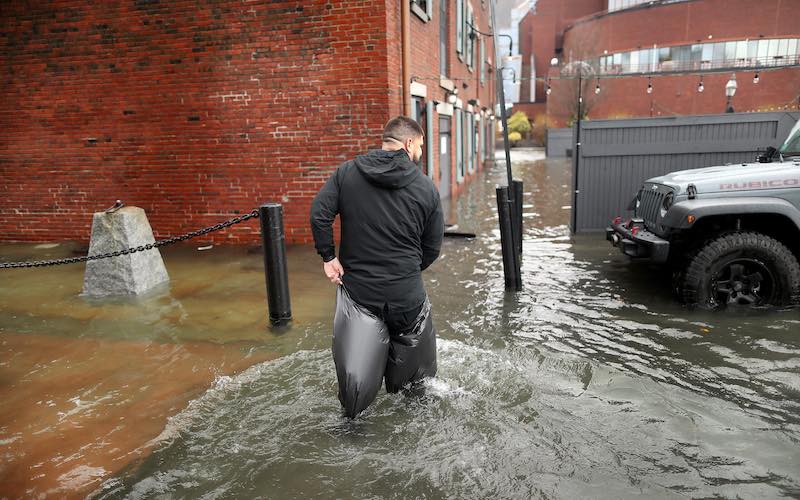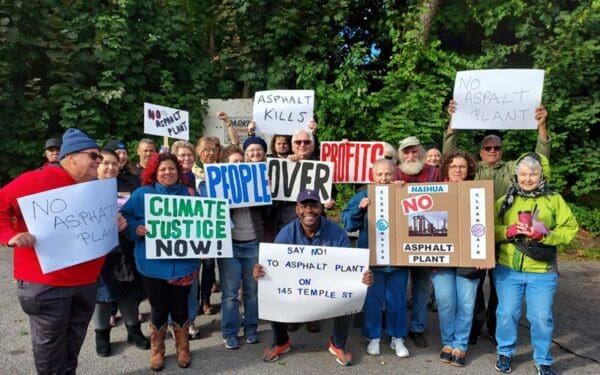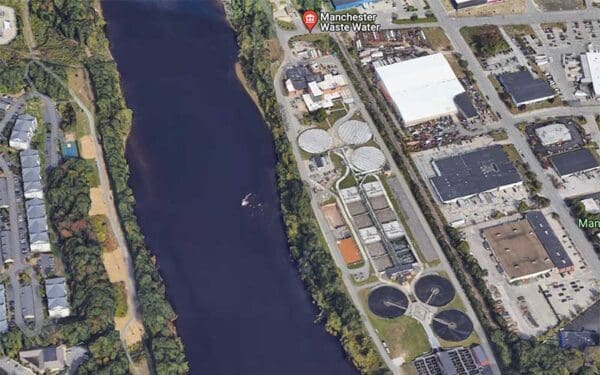
A restaurant worker negotiates high water to get to work. Courtesy Boston Globe/JOHN TLUMACKI.
A recent photo in the Boston Globe speaks volumes about what we can expect for the future. A restaurant worker, outfitted with garbage bags on each leg, wades through knee-deep water to get to his kitchen in Boston’s Long Wharf. The deluge of water spilling into that neighborhood late last December resulted from an intense winter storm that pummeled the city at high tide. But Long Wharf was not the only area to be inundated with water. Flooding occurred across coastal areas from Revere to Scituate in Massachusetts and from Bristol to East Providence in Rhode Island. All around New England, roads closed, drivers got trapped in cars, and some public transit systems had to shut down.
Welcome to our new world. Climate disruption is forcing us to regularly grapple with extreme weather that includes both interminable heat waves and more powerful storms. And that’s why we need to act now on climate resiliency measures to ensure that our communities can cope with not only the climate impacts here today but with those yet to come.
CLF is pushing hard to ensure that our communities not only survive but thrive in our changing climate. That includes advocating for climate resiliency measures in how we construct buildings and prepare utility infrastructure. Newly constructed buildings should be built to handle more extreme temperatures, more frequent and severe flooding, greater winds, and other climate impacts. Similarly, our utility companies must proactively plan for and adapt their infrastructure to new climate conditions.
Now, two new bills before the Massachusetts legislature can address these issues. One bill will promote climate-safe buildings. The other will ensure climate-safe utility infrastructure and prevent utility companies from blocking local climate resilience efforts. Both bills would go a long way to bolstering our capacity to withstand the more powerful storms of the future.
We Need Climate Resiliency Planning
Given what we are experiencing, the two bills before the Senate (and two more in the House) are critically important and long overdue. The City of Boston has been warned that it can expect more than three times the number of days of high-tide flooding this year than in 2000. But buildings constructed in Massachusetts today under current building codes do not account for these changing climate conditions. Rather, they are based on outdated historical averages of climate patterns.
Similarly, utility companies in Massachusetts are not required to plan for climate impacts or bake them into their operations, infrastructure, or design. Research we’ve conducted here at CLF found that almost 30% of all power outages in Massachusetts in the past five years were due to climate-related reasons. And when those storms pass through, they’re causing more hours of outages in Black, Brown, low-income, and communities where English is not spoken at home. Utility companies should be doing this kind of research themselves in preparation for climate-resilience interventions, but they’re not.
It’s never been clearer that the effects of climate change are here but we’re not dealing with it.
Unless we get serious about climate resiliency, the next time a powerful storm sweeps through, we will see more flooding, more public transit closures, more downed powerlines, more electricity outages.
CLF is working at the state and local levels to push leaders to pass these bills into law. You can help. Sign up for our email action alert so you’ll know when you can speak up and take action. We need to move our climate resiliency strategy beyond wearing trash bags as waders.




